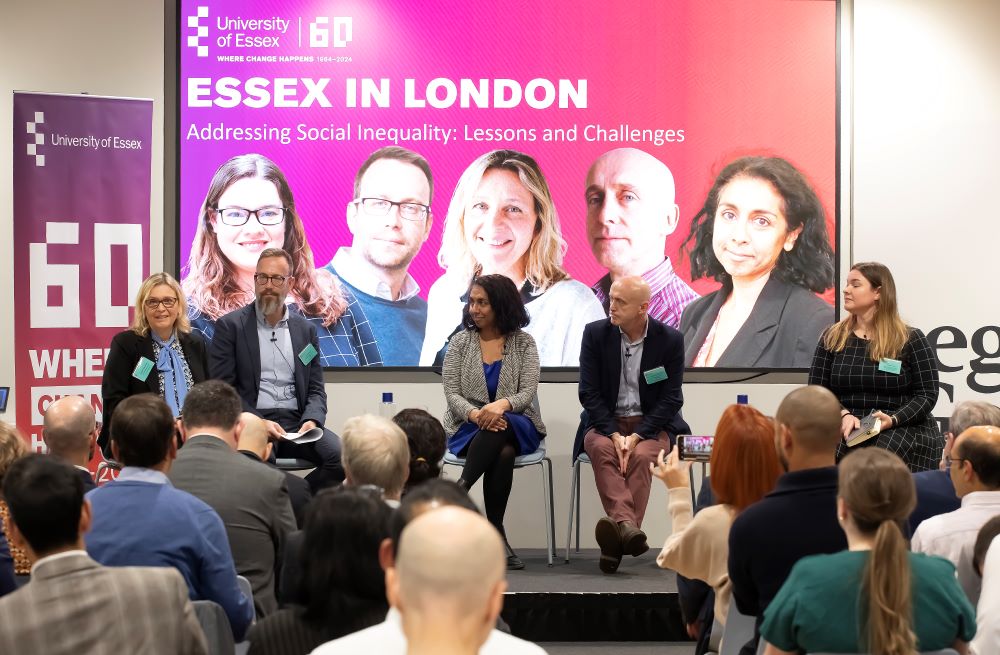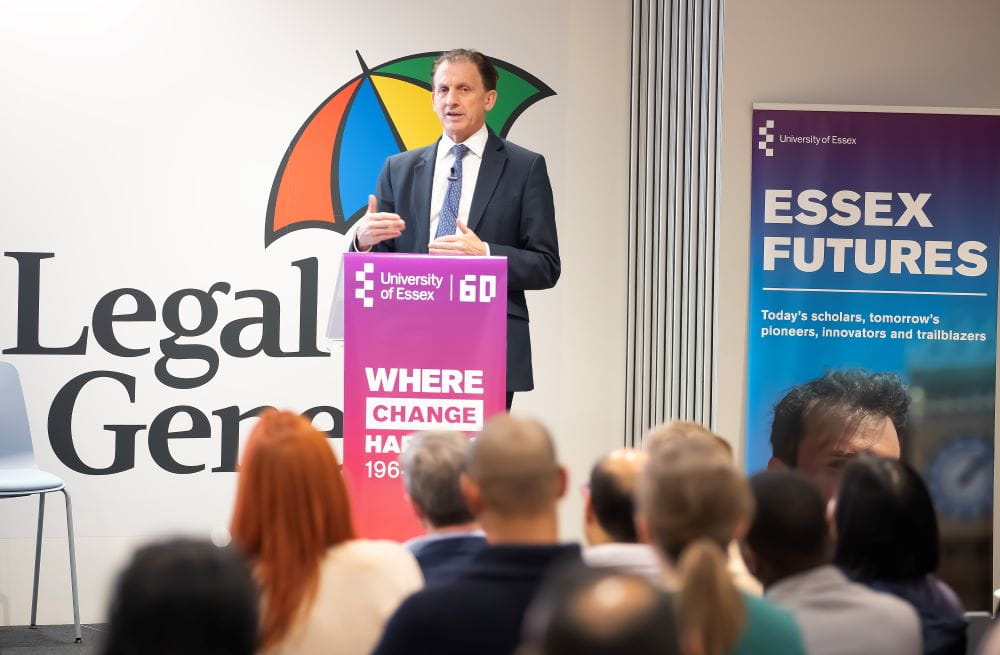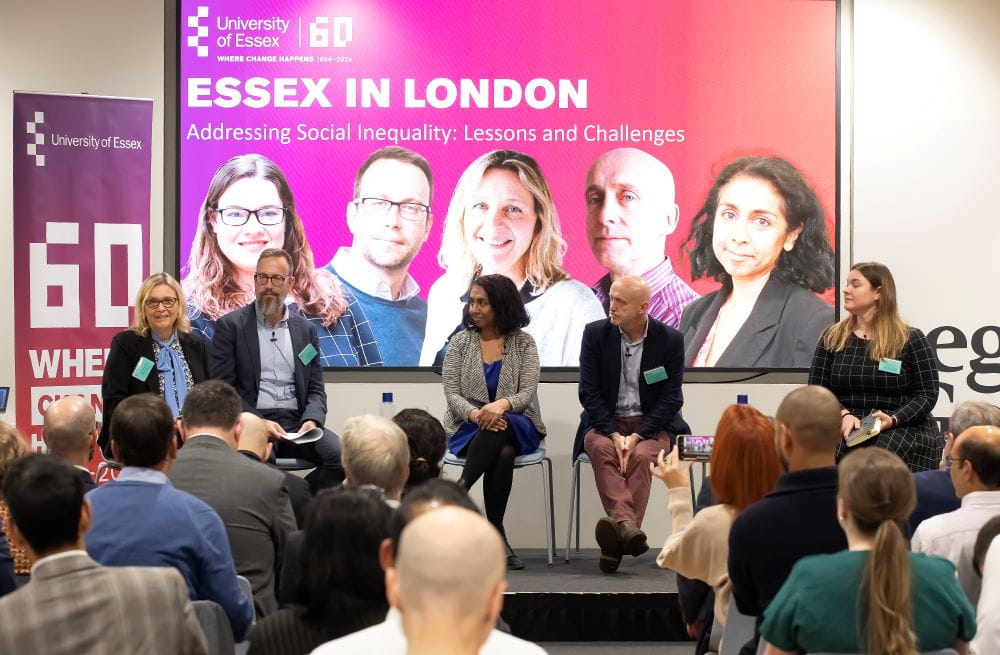Social Inequality: Lessons and Challenges Essex in London L&G – 24 October 2023

Our latest “Essex in London” event took place on 24 October 2023. This event was particularly special as it marks the first public event of the new academic year as Essex celebrates the 60th anniversary. We were delighted to be hosted at the Legal and General headquarters in the heart of the City, by Sir Nigel Wilson, the Group’s CEO and Essex Alumnus, for a special keynote speech and panel discussion on: ‘Social inequality: lessons and challenges’.

“Professor Kula leads the Faculty of social sciences that makes Essex a world leading university in the field of social sciences.”
Essex has a strong history of influential research in social sciences. Welcoming everyone was Professor Nancy Kula, Executive Dean of the Faculty.
Social inequalities are pressing and enduring challenges for society. The ongoing cost-of-living crisis disproportionately affects the low-income households and communities with major consequences for their financial, physical, and mental wellbeing. The UK has one of the highest levels of inequality in Europe with currently over 11m people living in relative poverty and one of the highest Gini Index in Europe.1
Recent years have seen a shift in the perception of the role that businesses should play in society and the expectations associated with this role. Many organisations are now recognising a call to a higher purpose and an understanding that businesses have a responsibility for fostering a more inclusive, equitable and fair economy.
Sir Nigel delivered an insightful keynote speech on the need for a more inclusive capitalism2 to reverse drift and decline.
What is inclusive capitalism?
Inclusive capitalism is a form of stakeholder capitalism that fosters broad value creation. It has emerged in recent years as a new form of capitalism in contrast to Milton Friedman’s shareholder primacy model of capitalism.3 Inclusive capitalism emphasises making capitalism more equitable and inclusive to ensure that the benefits of economic activity are more widely distributed among all stakeholders, including customers, employees, suppliers, communities, and the environment (Paine, 2023). According to CIC (2023), companies practicing capitalism inclusively and sustainably strengthen the economy and society as a by-product of their pursuit of profit.

“Sir Nigel Wilson is one of the UK’s most influential business leaders and is also one of the most prominent Alumni of our University. He achieved a First in his BA in Economics in 1978, followed up by a distinction in his MA before going on to attain a PhD in Economics at MIT in the United States.”
A key aspect of inclusive capitalism is the necessity for a collective effort to create a more equitable and sustainable economic system. The findings from the latest “Rebuilding Britain Index” (RBI) reveal how long-term collaboration across a breadth of sectors can help tackle health inequalities, by reducing disparities in pay and in-work benefits, and building better places for people. 4
In his keynote speech, Sir Nigel emphasised how, “collaborative partnerships can help solve economic, financial, and societal problems”, as we need to tackle the challenges that society is facing, from climate change to sustainable food and water, to inequality in education, healthcare, income, wealth, digital, and housing. Sir Nigel recognised the importance of science and technology in this context, while also acknowledging the various new risks they pose to society, including those associated with cyber security and excessive surveillance, among others.
Social science perspectives on social inequality
As part of our “Essex in London” event, I was delighted to be chairing an expert panel composed by four high-profile academics from the Faculty of Social Sciences at the University of Essex.

Panellists from the Faculty of Social Science at the University of Essex. In image from left to right: Professor Claudia Girardone (Chair); Professor Neil Kellard; Professor Meena Kumari; Professor Marco Francesconi and Dr Danielle Tucker.
Identifying theories and tools for a health inequality framework
The first panellist was Meena Kumari, Professor of Biological and Social Epidemiology, who discussed the importance of considering various factors influencing inequality, including their nature and interplay leading to unfavourable outcomes. She emphasised the need to examine the connection between “material” conditions (e.g., income, education, employment status, housing, and healthcare services) and “social” factors (e.g., social norms, cultural practices, social networks, discrimination, and access to education) when investigating health disparities in society. These social factors can indirectly impact health through psychological and behavioural pathways; as an example, limited social support in a community can induce stress and harm health.
Social epidemiology often uses ‘lifecourse theories’ to understand health and disease development over a lifetime due to various factors. Professor Kumari also highlighted how life course transitions like marriage, parenthood, and retirement impact health and behaviour. In a recent study, Professor Kumari’s significant finding was the association of house renting with accelerated biological ageing based on biomarkers. 5 Biomarkers offer objective measures for assessing health disparities when studying the processes that underpin intersectional health inequalities.
The finance sector has a critical role in mitigating social inequalities
Professor Neil Kellard, an expert in finance, focused his discussion on the relation of finance and the financial sector to income inequality, health, innovation, and investment. In one of his recent studies, 6 he analyses over a century of data from 1870 to 2011 for 21 OECD countries, including the UK and discovers that financial development decreases income inequality in the short run mostly through increased financial inclusion. However, in the long run it tends to exacerbate it, favouring those already included, thus suggesting a need for redistribution.
In another study on private equity in the UK over the 2010s, Professor Kellard demonstrates that measures of uncertainty, particularly those closely aligned to Brexit, have had a detrimental impact on private equity activity. His findings indicate that the current and ongoing uncertainty in Brexit policies will persistently hinder private equity activity and, consequently, investment and growth in the UK. 7 ‘Policymakers are urged to resolve such uncertainties’, cautioned Professor Kellard, calling for the need for more investments, in line with the Sir Nigel’s plenary speech.
Challenging traditional metrics that contribute to inequality benchmarks and the unintended effects of labour reforms
Economics Professor Marco Francesconi presented the findings from two recent research studies both related to inequality and noted how in both cases the results ‘challenge conventional wisdom in economics, one about income inequality, the other about labour market competitiveness’.
The first study 8 on Norway, employs a novel definition of business income, utilising new data encompassing all firms in the country. Surprisingly, it reveals significant disparities even in a country known for its equality. The new measure doubles the income share for the top 1% and increases it four to five times for the top 0.1% and 0.01%. Notably, it yields Gini estimates 25%-50% higher than official measures and highlight tax regressivity for individuals in the top 1%.
The second study9 examines labour market competitiveness and the impact of the 2012 reform in Italy, which reduced the cost of dismissing permanent workers for companies. Using a novel methodology, Professor Francesconi’s findings reveal that job loss leads to reduced re-employment probabilities and lower wages (about 20%). Erosion of employment protection legislation worsens these effects, disproportionately impacting already disadvantaged workers, such as females, younger individuals, and those in the poorest regions.
Policy alienation of frontline professionals and social inequality in health and social care
The final panellist, Dr Danielle Tucker, an expert in public sector management, offered a public service perspective on social inequality, specifically in the context of health and social care. She recently examined a phenomenon called ‘policy alienation’ which occurs when frontline public professionals feel disconnected from the policies they are tasked with implementing and the core purpose of their daily work.10 Dr Tucker explained that in recent years, various health and care policies have aimed to address social inequality, including the recent initiative to integrate care within communities. However, in her research, she noticed a recurring pattern where policies initially prioritise enhancing patient experience and fostering more inclusive care, but eventually shift their focus towards cost savings and efficiency gains.
Dr Tucker said: “We ask employees to do more with less, leading to work intensification and more siloed working. When we prioritise data over people, front line employees feel powerless to implement policy.” This is significant for several reasons, not least because front line health and care workers are best positioned to address social inequality. They understand the challenges and concerns of local community members and may even experience some of these inequalities themselves. Moreover, when front line employees lack motivation or are not empowered to use their discretion, inequalities created by the system persist.
What are the challenges for the future?
The panellists provided various perspectives on social inequality aiming to identify lessons learnt, covering the theories and research tools used to study social inequality and drawing from their rigorous and most up-to-date research in the fields of social epidemiology, finance, economics, and management.
In particular, they emphasised the importance of employing reliable and robust measures for assessing inequalities and the continual testing of existing ones. They also cautioned about the possible unintended consequences of well-intentioned reforms and policies which may exacerbate social inequalities. This was evident in the case of the employment protection legislation in Italy, that ultimately impacted already disadvantaged workers; and recent social care reforms such as the integrated care systems in the UK that causes alienation to frontline public sector workers.
An essential aspect of the panel discussion highlighted the significance of a well-functioning financial system in allocating limited financial capital where it is most needed, thus promoting growth and reducing inequality. However, the challenge lies in the fact that the presence of one does not automatically ensure the other.
There are crucial areas where finance and inequality clearly interrelate, such as financial education and literacy, financial resilience and mental health as well as diversity bias in employment and compensation. These are among the areas that would require more research and should be higher in the UK policy agenda.
In his plenary speech, Sir Nigel observed that in the UK there is a pressing need to enhance productivity, foster the real wage growth, and widen access to essential services, particularly in an aging society where preventative care becomes increasingly significant. However, any government intervention would further exacerbate the nation’s debt burden given the annual ongoing rise in the annual budget deficit which stands at approximately £130bn.
Collaborative partnerships as possible solutions
In light of these challenge, Sir Nigel elaborated on the importance of collaborative actions and partnerships with the private sector. He emphasised how such collaborations could facilitate development through investing in new real assets that lead to the creation of new employment opportunities resulting in real wage growth.
Legal & General has already set up fruitful collaborations is several cities in England and Scotland, investing with universities, local councils and strategic co-investors for providing access to specialist capability in clean energy, housing, alternative finance and specialist commercial real estate. Building on these successes, I hope that L&G will also consider the East of England as a strategic investment opportunity, given the need for tackling economic and social challenges and the significant growth potential for the future.
1. Source: Statista. The Gini Index is a measure of inequality within economies, a lower (higher) score indicates more (less) equality. In 2022 the UK’s Gini Index was 35.7 against the EU average of 29.6.
2. Wilson, Nigel (2023) “Delivering Inclusive Capitalism: Reversing Drift and Decline”, Keynote speech.
3. Milton Friedman, an influential economist, proposed that a company’s sole responsibility is to its shareholders without any social responsibility to the public or society.
4. The Legal & General’s RBI is a community-led index that surveys 20,000 people annually and tracks social and economic progress across the UK. The regular monitoring of RBI allows the identification of areas in need of investment, as it combines data on deprivation, including life expectancy, earnings and unemployment with survey data.
5. Clair et al. (2023).
6. Makhlouf et al. (2020).
7. Kellard et al. (2022).
8. Francesconi and Sonedda (2023).
9. Aaberged et al. (2023)
10. Tucker et al. (2022).
Cited References
- Aaberge R., Francesconi M., Modalsli J., and Vestad O. (2023), How Business Income Affects Income Inequality, mimeo.
- Council for Inclusive Capitalism (2023), https://www.inclusivecapitalism.com/news-insights/stakeholder-capitalism-is-capitalism/
- Clair A., Baker E., and Kumari M. (2023), Are Housing Circumstances Associated With Faster Epigenetic Ageing? Journal of Epidemiology and Community Health, October.
- Francesconi M. and Sonedda D. (2023), Heterogeneous Costs of Job Loss When Employment Protection Is Eroded, mimeo.
- Friedman M. (1970), A Friedman doctrine. The Social Responsibility of Business Is to Increase Its Profits, September 13th https://www.nytimes.com/1970/09/13/archives/a-friedman-doctrine-the-social-responsibility-of-business-is-to.html
- Kellard, N.M., Kontonikas, A., Lamla, M. and Maiani, S., (2022), Deal or No Deal? Modelling the Impact of Brexit Uncertainty on UK Private Equity Activity, British Journal of Management, 33 (1), 46-68.
- Makhlouf, Y., Kellard, N.M. and Vinogradov, D., (2020), Finance-Inequality Nexus: The Long and the Short of It, Economic Inquiry, 58 (4), 1977-1994.
- Paine, L.S. (2023). Corporate Leaders Say They Are For Stakeholder Capitalism—But Which Version Exactly? A Critical Look at Four Varieties. A Critical Look at Four Varieties, Harvard Business School General Management Unit Working Paper, pp. 24-008.
- Rebuilding Britain Index (2023), https://bit.ly/45rfoug.
- Tucker, D. A., Hendy, J., & Chrysanthaki, T. (2022). How Does Policy Alienation Develop? Exploring Street-Level Bureaucrats’ Agency in Policy Context Shift in UK Telehealthcare, Human Relations, 75(9), 1679-1706.
- Wilson, N. (2023) “Delivering Inclusive Capitalism: Reversing Drift and Decline”, Keynote speech, Legal & General, London, 24 October.
